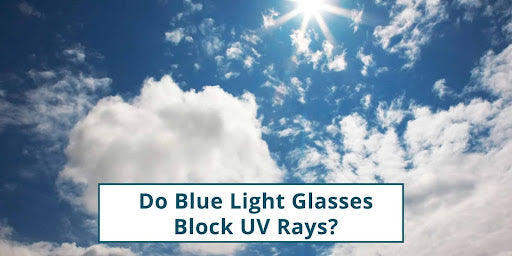
Do Blue Light Glasses Block UV Rays? Let’s Find Out
Blue light glasses are tailor-made for your screen-heavy lifestyle. But, what if you also want to protect your eyes from bright sunlight?
Excessive blue light can affect your sleep and eye health. Similarly, prolonged exposure to UV rays can lead to skin and eye diseases.
If you’re wondering, “Do blue light glasses block UV rays?”, here’s a short answer: Some blue light glasses come with UV protection.
In this post, we’ll talk about:
- The basics of blue and UV lights
- How do blue light glasses block UV rays
- The benefits of getting a pair of glasses with dual protection
- How to select blue light glasses with UV protection
Let’s dive in.
Understanding Blue Light and UV Rays
To understand if and how blue light glasses block UV rays, let’s first learn about excess exposure to blue and UV light can impact your health.
What is Blue Light?
Blue light is a part of white light. If you’ve seen a rainbow, you might have noticed a blueish color sandwiched between indigo and green.
This blue light is a part of the light the Sun emits. But the light from the sun has a purpose and benefit: It keeps us alert and awake during the day and boosts our mood.
We don’t need that after sunset. We need our bodies to relax and get ready to sleep. Blue light from digital devices makes that difficult by disrupting the production of melatonin, the sleep hormone.
What are UV Rays?
Ultraviolet rays are invisible. Our Earth’s atmosphere blocks some of these rays; the remaining reach us.
Prolonged exposure to UV rays can lead to serious health conditions like cataracts, macular degeneration, and even skin cancer.
Now, sunglasses are designed to block these rays, but can blue light glasses do the same thing? Let’s find out.
Do Blue Light Glasses Block UV Rays?
Blue light glasses, as the name suggests, are specifically designed to block blue light. But, some brands design glasses that perform both functions: Block blue light as well as UV rays. Here’s how that works.
The Role of Lens Materials
Some blue light glasses use polycarbonate lenses, a durable and lightweight material that blocks almost 100% of the UV rays.
So, if a pair of blue light glasses comes with polycarbonate lenses, you can use them for dual purposes: To shield your eyes from blue light from screens and UV rays from the Sun.
Scientific Evidence
A scientific study tested different eyewear, including blue light and UV blockers. It found that tinted polycarbonate lenses blocked 100% of the UV light and 67 to 99.8% of blue light.
This means glasses with polycarbonate lenses can offer effective protection against UV light.
The Catch: Not All Glasses Are Equal
Blue light glasses are generally designed for digital screens. Not all of them offer UV protection. If you want dual protection, you need to get a pair with UV protection as a feature.
Here’s a detailed walkthrough.
How to Choose Blue Light Glasses with UV Protection?
Let’s help you pick the right pair for your needs (With UV protection).
Choose Polycarbonate Lenses: Polycarbonate material naturally blocks UV rays, making it a reliable choice for outdoor use.
Verify Product Details: If a pair of blue light glasses offers UV protection, it’ll be written in the product description. If you don’t find the information, ask your manufacturer for it.
Match Your Needs: Get amber-tinted glasses with UV protection to improve your sleep at night and protect yourself from the Sun’s UV rays during the day.
Alternatively, get a pair of yellow-tinted glasses for eye comfort while using screens. It depends on what you need from these lenses.
Check Standards: Last but not least, make sure the glasses meet the ISO standards for 100% UV protection up to 400 nm (ISO 12311:2013 or ANSI Z80.3).
Benefits of Dual Protection
Let’s quickly recap the benefits you'll get with dual protection glasses.
The first and primary benefit of these glasses is that they can help your sleep quality and eye strain by blocking the high-energy blue light.
Secondly, they block the harmful UV rays of the Sun, protecting you from potential eye issues.
Frequently Asked Questions
Let’s quickly discuss some commonly asked questions about whether blue light glasses block UV rays.
Can Blue Light Glasses Block UV Light?
Many blue light glasses block UV light. They commonly have polycarbonate lenses that block out 100% of the UVA and UVB up to 400 nm.
What Are the Negatives of Blue Light Glasses?
Amber-tinted blue light glasses may cause color distortion, making them unsuitable for color-sensitive tasks, like graphic design. Some people may feel discomfort and slight headaches after wearing them.
Is It Okay to Wear Blue Light Glasses in the Sun?
Yes, especially if they offer UV protection. You can also wear plain blue light glasses, but without UV protection, they’ll only help with glare.
Do Blue Light Glasses Work as Sunglasses?
Some blue light glasses with polycarbonate lenses or UV protection act as sunglasses. However, they may not be dark enough for bright sunlight.
Conclusion
The primary job of blue light glasses is to block blue light from digital screens like TVs, mobile phones, and laptops.
However, some brands do sell blue light glasses with UV protection. These typically have polycarbonate lenses that block 100% of the UV rays.
These glasses are perfect for you if you spend a significant amount of time in front of screens as well as outdoors in bright sunlight.
